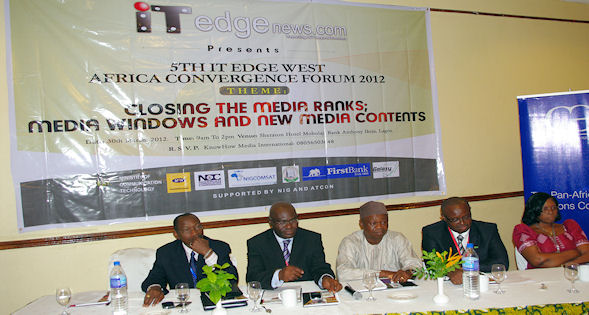By SEGUN ORUAME
In five hours at the yearly one-day IT Edge West Africa Convergence Forum, about 157 stakeholders from sectors as diverse as broadcast, telecom, banking and courier, considered the thinning lines in an industry in transition. For a forum that has gained as much value in pedigree as in ability to gather critical stakeholders in the last six years, this year’s conclusion for the one-day event re-coached the outcome of Forum 2005: everything will ride over IP- Internet Protocol (EoIP).
An exciting conclusion that reinforces the arguments for change within the regulatory space, the need for government and private sector stakeholders to rethink their policy and business strategies. The conclusion incisively asserts: mobile payment platforms holds the ace in a society bound to go cashless; broadcast, telecoms and other once distinct services have become simply contents passed through delivery pipes; once providers build the infrastructures, content providers will emerge and consumers will come; regulators must contend with tackling the new game changers; and copyright issues will arise as often as consumers seek new converged services.
The key to getting converged services is robust infrastructure. As Aki Innocent, Senior Project Manager, Alcatel-lucent Middle East, Turkey and Africa put it in his presentation during Session I that asked the question: ‘Where are the infrastructures to drive Broadband & Convergence?’ “From the infrastructure point of view, African countries need to transform their networks to develop broadband.”
Africa appears already to be working on transforming its infrastructure landscape. In the last four years, much bandwidth capacity has been built round undersea cables owned by private sector infrastructure owners. For instance, capacity of internet broadband coming into Nigeria through submarine cable is 4760 Gbits/s from SAT-3, MainOne, and Glo-1. Add that from Nigomsat-1R, a satellite communication backbone, you have more capacity to drive convergence on robust connectivity pipes. Nigcomsat-1R carries a communication payload that comprises of 40 transponders; 28 active and 12 redundant. Despite all these, Nigeria and most of Africa are tasked with taking the connectivity to the last mile users where the communication begins to have relevance. Much of Africa capital cities and most rural communities are still not connected making services within converged environment such as MobileTV, mobile money elitist offerings in major urban centres.
And there are other issues outside of infrastructures in the converging environment. Everything is changing, the media for instance, and so are banking and courier services among several others. Take the broadcast media industry for instance, “the combination of shifts in communications control and patterns is redefining the competitive landscape, giving rise to new business models. In contrast with traditional models, emerging models are based on open platforms that support many-to-many and collaborative patterns,” said Director General, National Broadcasting Commission, Engr. Yomi Bolarinwa.
“Convergence is altering and providing new ways on how information can be accessed. The increasing demand of these new technologies implies employment in the content business…. The new environment demands the development of new skill and knowledge by broadcast operators and practitioners,” said Engr Gregory Gbadamosi, former Zonal Director at the Nigerian Television Authority.
The driving factor for convergence in the media according to Mr. Raji Oladipo, General Manager, DCC Networks (Communications division of Computer) include “consolidation”, the need to have “one devise for every service, and have all service on any device; the need to do more within less time and the need to do more activities simultaneously; the need to know just as it happens because timely information is money.”
And in the financial sector, “the widespread adoption of Internet and mobile technology is changing the way people connect and transact across the globe. The number of mobile phone subscribers would hit six billion people in 2013 and about 80% of the world population lives within cellular networks. Makers of mobile devices distributed a total of 101m smartphones in the last three months of the year, up 87% from the same period a year earlier, according to International Data Corp, the market researcher. Within the growth there are strong influences changing the shape of the industry. They include Convergence and its consequences in the financial sector including e-Money, contactless NFC, e-Wallet and e-Commerce among others,” said Mr. Chuma Ezirim, Group Head, e-Business, First Bank of Nigeria Plc.


































